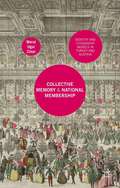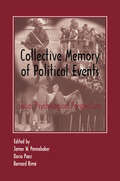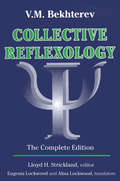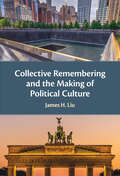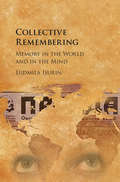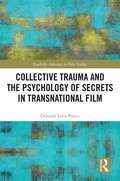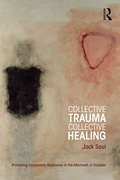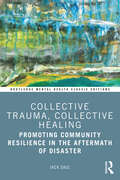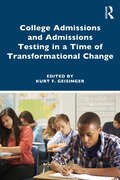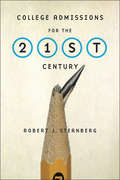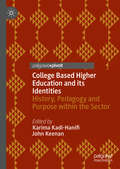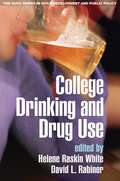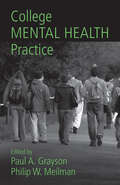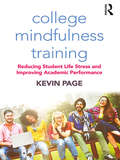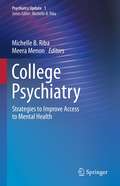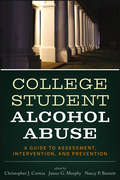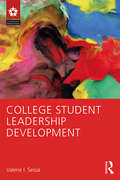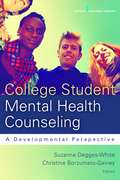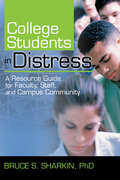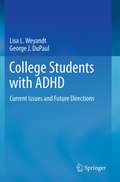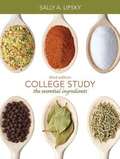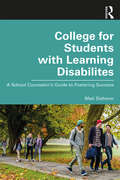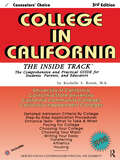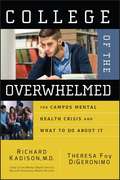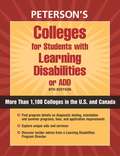- Table View
- List View
Collective Memory and National Membership
by Meral Ugur CinarThis study explores the role played by collective perceptions of the past in constructing, maintaining, and challenging views of citizenship and national identity while taking divergent visions of the past seriously. It seeks to understand how much of the disparity in the way citizenship questions are approached can be explained by the differences in visions of the past. Drawing on comparative historical analysis of two post-imperial core countries, Turkey and Austria, this volume explores how differences in perspectives on the past inform citizenship debates. It looks at the ways in which different forms of historical narratives foster certain citizenship models and create resistance against others. By doing this, it develops a conceptual framework applicable beyond the two cases when analyzing the history-identity nexus at the collective level.
Collective Memory of Political Events: Social Psychological Perspectives
by James W. Pennebaker Bernard Rimé Dario PaezResearch in collective memory is a relatively new area capturing the interest of scholars in social psychology, memory, sociology, and anthropology. The core idea is that collective attitudes and behaviors are created and shared through common experiences and communication among a cohort of people. For example, people born between 1940 and 1960 are often defined via the JFK assassination and the Vietnam War. Their parents typically experienced lesser impact from these events. Papers about collective memory have appeared in the literature under different guises for the last hundred years. Freud's Civilization and Its Discontents, Jung's ideas on the collective unconscious, and McDougall's speculation on the group mind posited that identity and action could be viewed as resulting from the shared development of a culture. Halbwachs, a French social psychologist (1877-1945) who was the first to write in detail about the nature of collective memory, argued that basic memory processes were all social. That is, people remember only those events that they have repeated and elaborated in their discussions with others. In the last several years, there has been a resurgence of interest in this general topic because it addresses some fundamental questions about memory and social processes. Work closely related to these questions deals with the nature of autobiographical memory, traumatic experience and reconstructive memory, and social sharing of memories. This book brings together an international group of researchers who have been empirically studying some basic tenets of collective memory.
Collective Reflexology: The Complete Edition
by V. M. BekhterevVladimir Mikhailovitch Bekhterev was a pioneering Russian neurologist, psychiatrist, and psychologist. A highly esteemed rival of Ivan Pavlov, his achievements in the areas of personality, clinical psychology, and political and social psychology were recognized and acclaimed throughout the world. Publication of the complete text of Collective Reflexology brings to the English-speaking world this brilliant scientist's final theoretical statements on how reflexological principles, which he had been developing over a quarter century, can be extended far beyond analysis of the individual personality. Bekhterev's work grows out of his interest in group psychology and suggestion. This concept of the reflex is much broader than Pavlov's. It is applicable to every variety of life. Bekhterev compared his own analyses to those of other European thinkers such as Comte, LeBon, and Sorokin. Such analyses strained against the official Marxist-Leninist doctrines of the era. Bekhterev died in 1927, allegedly of poisoning by Stalin's henchman. As with many scientists during the Soviet era, his legacy was suppressed. In the normal course of events his name would have been as well known as that of Freud, Pavlov or, more lately, B.F. Skinner. This first publication of Bekhterev's great work in English fills a void in the fields of psychology, sociology, and the history of science. V.M. Bekhterev was director of the Military Medical Academy in St. Petersburg and founded there its Psychoneurological Institute. Among his many books are Suggestion: Its Role in Social Life (available from Transaction) and The Subject Matter and Goals of Social Psychology. Lloyd H. Strickland is professor of psychology at Carleton University. He is the author of numerous journal articles and editor of Directions in Soviet Social Psychology and Soviet and Western Perspectives in Social Psychology."Bekhterev (1857-1927) is a formidable figure, and his work continues to deserve careful study."-Canadian Psychology
Collective Remembering and the Making of Political Culture
by James H. LiuCollective memory can make and break political culture around the world. Representations and reinterpretations of the past intersect with actions that shape the future. A nation's political culture emerges from complex layers of institutional and individual responses to historical events. Society changes and is changed by these layers of memory over time. Understanding them gives us insight into where we are today. Encompassing examples from colonization and decolonization, revolving around the critical junctures of the world wars, this book illustrates how collective memory is produced and organized, through commemoration, through monuments, and through individuals sharing stories. Using concrete examples from around the world, James H. Liu shows how different disciplines can come together through shared concepts like narratives and generational memories to provide mutually enriching perspectives on how political culture is made, and how it changes.
Collective Remembering: Memory in the World and in the Mind
by Ludmila IsurinThis interdisciplinary study explores collective memory as it is presented by official producers (such as textbooks and media) and reflected by consumers (group members). Focusing on a case study of Russians and Russian immigrants to the USA and their memories of seminal events in the twentieth-century Russian collective past, Isurin shows how autobiographical memory contributes to the formation of collective memory, and also examines how the memory of the shared past is reconstructed by those who stayed with the group and those who left. By bringing together historical, anthropological, and psychological approaches, Collective Remembering provides a new theoretical framework for memory studies that incorporates both content analysis of texts and empirical data from human participants, thus demonstrating that methodologies from the humanities and the social sciences can complement each other to create a better understanding of how memory works in the world and in the mind.
Collective Trauma and the Psychology of Secrets in Transnational Film (Routledge Advances in Film Studies)
by Deborah Lynn PorterCollective Trauma and the Psychology of Secrets in Transnational Film advances a methodological line of inquiry based on a fresh insight into the ways in which cinematic meaning is generated and can be ascertained. Premised on a critical reading strategy informed by a metapsychology of secrets, the book features analyses of internationally acclaimed films—Guillermo del Torro’s Pan’s Labyrinth, Andrey Zvyagintsev’s The Return, Jee-woon Kim’s A Tale of Two Sisters, and Alejandro Amenábar’s The Others. It demonstrates how a rethinking of the figure of the secret in national film yields a new vantage point for examining heretofore unrecognized connections between collective historical experience, cinematic production and a transnational aesthetic of concealment and hiding.
Collective Trauma, Collective Healing: Promoting Community Resilience in the Aftermath of Disaster (Psychosocial Stress Series)
by Jack SaulCollective Trauma, Collective Healing is a guide for mental health professionals working in response to large-scale political violence or natural disaster. It provides a framework that practitioners can use to develop their own community based, collective approach to treating trauma and providing clinical services that are both culturally and contextually appropriate. Clinicians will come away from the book with a solid understanding of new roles that health and mental health professionals play in disasters—roles that encourage them to recognize and enhance the resilience and coping skills in families, organizations, and the community at large. The book draws on experience working with survivors, their families, and communities in the Holocaust, postwar Kosovo, the Liberian civil wars, and post-9/11 lower Manhattan. It tracks the development of community programs and projects based on a family and community resilience approach, including those that enhance the collective capacities for narration and public conversation.
Collective Trauma, Collective Healing: Promoting Community Resilience in the Aftermath of Disaster (Routledge Mental Health Classic Editions)
by Jack SaulCollective Trauma, Collective Healing is a guide for mental health professionals working in response to large-scale political violence or natural disaster. It provides a framework that practitioners can use to develop their own community-based, collective approach to treating trauma and providing clinical services that are both culturally and contextually appropriate. The classic edition includes a new preface from the author reflecting on changes to the field and the world since the book’s initial publication. The book draws on experience working with survivors, their families, and communities in the Holocaust, post-war Kosovo, the Liberian civil wars, and post-9/11 Lower Manhattan. It tracks the development of community programs and projects based on a family and community resilience approach, including those that enhance the collective capacities for narration and public conversation. Clinicians and community practitioners will come away from Collective Trauma, Collective Healing with a solid understanding of new roles they may play in disasters—roles that encourage them to recognize and enhance the resilience and coping skills in families, organizations, and the community at large.
College Admissions and Admissions Testing in a Time of Transformational Change
by Kurt F. GeisingerPerhaps no topic in higher education is more controversial than admissions, whether it be to a prestigious college, graduate schools, or professional schools. In response to the pandemic and a host of race relations issues in the country, many colleges and universities have changed their policies regarding admissions testing. In this foundational volume, renowned chapter authors address a diverse set of themes related to college admissions, examining new perspectives, exploring the strengths and weaknesses of current practices, and discussing how institutions might use different techniques to attract diverse students, particularly those who have not traditionally attended college. Experts in college admission testing, admissions research, and psychology come together to provide empirically based approaches and ideas. Ultimately, this volume advances a future in college admissions where more students are able to succeed in college and beyond.
College Admissions for the 21st Century
by Robert J. SternbergSATs, ACTs, GPAs. Everyone knows that these scores can’t tell a college everything that’s important about an applicant. But what else should admissions officers look for, and how can they know it when they see it? In College Admissions for the 21st Century a leading researcher on intelligence and creativity offers a bold and practical approach to college admissions testing. Standardized tests are measures of memory and analytical skills. But the ever-changing global society beyond a college campus needs more than just those qualities, argues Robert Sternberg. Tomorrow’s leaders and citizens also need creativity, practicality, and wisdom. How can the potential for those complex qualities be measured? One answer is “Kaleidoscope,” a new initiative in undergraduate admissions, first used at Tufts University. Its open-ended questions for applicants, and the means used to score the answers, gives applicants and admissions officers the chance to go beyond standardized tests. Does it work? As Sternberg describes in detail, Kaleidoscope measures predicted first-year academic success, over and above SATs and high school GPAs, and predicted first-year extracurricular activities, leadership, and active citizenship as well. And every year that Kaleidoscope measures were used, the entering class’s average SATs and high school GPAs went up too. What worked at Tufts can work elsewhere. New kinds of assessments, like Kaleidoscope, can liberate many colleges and students from the narrowness of standardized tests and inspire new approaches to teaching for new kinds of talented, motivated citizens of the world.
College Based Higher Education and its Identities: History, Pedagogy and Purpose within the Sector
by Karima Kadi-Hanifi John KeenanThis book explores the history, purpose and understandings of College Based Higher Education. Drawing together the perspectives of researchers and practitioners in the field, the book traces its history and aims, and identifies issues paramount to the survival of the sector, uniting a wealth of knowledge and experience. Emphasising the need for a distinct identity, unique teaching and a research culture, this book acts as a clarion call for the sector to recognise its own importance and value, and to act as a hope in a higher education environment which is increasingly marketised, competitive and unsustainable. This book will appeal to scholars of College Based Higher Education and higher education in general, as well as policy makers and practitioners.
College Drinking and Drug Use
by David L. Rabiner Helene Raskin WhiteSubstance use among college students can result in serious academic and safety problems and have long-term negative repercussions. This state-of-the-art volume draws on the latest research on students' alcohol and drug use to provide useful suggestions for how to address this critical issue on college campuses. Leading researchers from multiple disciplines examine the prevalence and nature of substance use by students; biological and neuropsychological considerations; psychological and social aspects; prevention; and policy. Exemplary programs are presented including brief interventions, comprehensive prevention programs, and recovery support programs enhancing the utility of the book for campus-based clinicians and administrators
College Mental Health Practice
by Paul A. Grayson Philip W. MeilmanPaul Grayson, a co-editor of the successful 1989 book College Psychotherapy, has teamed up with Phil Meilman, a seasoned veteran of college counseling and psychological services, to compile this needed comprehensive up-to-date treatment guide. After an opening discussion of the campus environment and student mentality, the book provides an overview of the state of college mental health at the start of the 21st century, touching on the issues faced by students of every generation, as well as those concerns unique to this day and age. With an emphasis on practice, and not theory, this easily referenced treatment guide will be of use to anyone working in the mental health fields in and around a college environment.
College Mindfulness Training: Reducing Student Life Stress and Improving Academic Performance
by Kevin PageCollege Mindfulness Training is a ground-breaking book that carefully combines selected meditation exercises with guidance explaining the background, scientific context, and practical applications of mindfulness practice. More than just a meditation manual, this book details how and why personal mindfulness practice is essential for the college-aged student. In addition to extensive practical exercises for both beginner and intermediate-level meditation students, the author explores the kinds of institutions and organizations that have arisen out of the popular mindfulness movement and what career options in the field may be available in the future. Throughout the manual, the author provides readers with insights into basic meditation techniques; active and passive meditation techniques; Focused Attention Meditation in both guided and self-guided forms; Open Monitoring Meditation; informal meditation exercises; a brief history of the MBSR program and Koru meditation; a survey of current apps and meditation-supportive technology platforms; and detailed instructions for self-driven practice, and a semester-long outline for teachers. A captivating read, this book covers many of the essentials of mindfulness meditation and self-care of interest to college students, making it an essential tool for those of college age seeking to practice mindfulness meditation as well as college educators seeking a guided system to enhance their students’ emotional well-being and academic performance.
College Psychiatry: Strategies to Improve Access to Mental Health (Psychiatry Update #1)
by Michelle B. Riba Meera MenonThis book explores the practical strategies outlined by national thought leaders to improve access to mental health care in the practice of college psychiatry. It addresses the escalating need for mental health services on college and university campuses.Concise yet comprehensive, the book considers the college experience for the increasingly diverse student body, including non-traditional college students, first-generation college students, and students with a history of mental illness. Beginning with a discussion on the current national health trends in college mental health, chapter one explores the current epidemiology of student mental health problems, the systemic challenges in recruitment, and funding psychiatric services. Subsequent chapters then delve into the various systems and models of psychiatric care for college students, including differing parental involvement levels and the importance of collaborative care to short term management and referral of students at risk. Chapters five and six examine mental health considerations for LGBTQ, Black, Indigenous, and People of Color students. Further chapters analyze the critical nature of successfully navigating a leave of absence, as well as the consideration of threat assessment on college campuses. The book closes with a highly relevant evaluation of telemental health and telepsychiatry in the College Setting as it pertains to the ongoing barriers to care caused by COVID-19. Socially conscious and timely, College Psychiatry is an indispensable text for all mental health professionals.
College Student Alcohol Abuse
by Christopher J. Correia Nancy P. Barnett James G. MurphyEssential evidence-based strategies for the prevention and reduction of alcohol abuse among college studentsWith contributions from notable substance abuse researchers, this practical guide presents clear strategies for prevention of and interventions for alcohol abuse in the college-age population.Ranging from community-based prevention programs to individual, motivational, and interview-based approaches, College Student Alcohol Abuse explores:The leading theories used to conceptualize college student drinking and related problems, with an emphasis on the clinical implications of each perspectiveEpidemiology of student drug use-including illicit drugs and nonmedical use of prescription drugsThe spectrum of empirically supported prevention programs with a focus on best practices and materialsHow to conduct assessments and create intervention programs for students with substance abuse problemsA must-have resource for every college administrator, resident staff member, and addiction counselor who works with this unique population, College Student Alcohol Abuse translates the latest research findings and interventions into clear and evidence-based strategies for assessing and treating college students who are abusing alcohol.
College Student Leadership Development (Leadership: Research and Practice)
by Valerie I. SessaCollege Student Leadership Development introduces the idea that we all play a part in producing leadership and that learning how to participate in the process of leadership is something that all college students need to learn as part of their college academic experience. Rather than approaching leadership from the traditional model emphasizing specific skill sets, this book acquaints students with how to learn leadership using the ReAChS model of leadership development (Reflection, Assessment, Challenge, Support). It then encourages students to directly engage their own experiences to hone their leader identity and understanding of leadership as well as improve their leadership knowledge and skills. Step-by-step exercises lead students in reflecting on their experiences, assessing themselves, choosing challenges, creating support networks, and finally capturing and communicating to others what they have learned. Throughout, examples of student leaders’ experiences provide readers with powerful examples of others’ successes and struggles in leadership alongside the latest psychological research on learning and development.
College Student Mental Health Counseling: A Developmental Approach
by Suzanne Degges-White Christine Borzumato-GaineyUsing a unique developmental focus, this clinical handbook provides college counseling professionals and trainees with strategies for addressing the most pressing and frequently encountered issues presented by college students. These problems are considered from the perspective of biological, psychological, and social development and include issues faced by the student population according to both college year (freshman, senior, etc.) and the academic calendar, such as spring and winter breaks and exam periods. The text also addresses the particular needs of non-traditional students and the impact of cultural identity on the way in which a disorder manifests or is best treated. <p><p> The only text to focus on both the developmental and clinical concerns of contemporary college students, it provides detailed information on such prevalent presenting issues as major depressive disorder, anxiety, substance abuse and addiction, eating disorders, grief, self-injury, social adjustment concerns, and intimate relationships. The text examines how a disorder usually presents and manifests in college students, addressing the role of gender, cultural identify, and age. It provides best practice treatment strategies that take into account the time-limited nature of treatment in most college counseling centers, and discusses the use of individual and group counseling. The text also addresses such issues as crisis management, teaming up with faculty and staff to develop preventive care programming, and developing alliances with parents. Case studies and descriptions of symptom presentation are derived from composites of students treated by the authors. College Student Clinical Mental Health Counseling will be useful as both a text and a "go-to" reference for counselors to use when working with students.
College Students in Distress: A Resource Guide for Faculty, Staff, and Campus Community
by Bruce SharkinBe prepared to deal with campus situations that involve students in emotional crisisCollege Students in Distress provides college personnel with invaluable information on how to identify and refer emotionally troubled students for professional counseling. Dr. Bruce S. Sharkin, a staff psychologist at Kutztown University in Pennsylvania, addresses general warning signs of student distress, symptoms of specific psychological problems such as anxiety and depression, guidelines for interventions, and methods of making a referral for counseling. The book also examines current mental health issues for college students and provides an overview of common campus policies and procedures, such as psychological emergencies, withdrawal and readmission, and mandatory counseling. College Students in Distress provides the answers you need to manage difficult-and potentially dangerous-situations on campus. Case examples based on real-life experiences give you a clear sense of what can happen when responding to students in emotional distress, particularly when dealing with specific issues and student populations, and will help in your efforts to review and/or revise the current practices of your school. This unique book is essential as a resource and referral guide that raises awareness of this growing national problem without being limited to the characteristics of a particular college or university. Topics examined in College Students in Distress include: the impact of mental health problems on academics the roles and functions of college counseling services indicators of emotional disturbance suicidal behavior self-inflicted harm eating disorders guidelines for intervention accommodations for students with psychological disabilities and much moreCollege Students in Distress is a must-read for faculty and staff members, particularly those working in residential life, student health, and public safety, and for administrative offices within student services and student affairs.
College Students with ADHD: Current Issues and Future Directions
by Lisa L. Weyandt George J. DupaulNot long ago, conventional wisdom held that ADHD was a disorder of childhood only--that somewhere during puberty or adolescence, the child would outgrow it. Now we know better: the majority of children with the disorder continue to display symptoms throughout adolescence and into adulthood. It is during the teen and young adult years that the psychological and academic needs of young people with ADHD change considerably, and clinical and campus professionals are not always sufficiently prepared to meet the challenge. College Students with ADHD is designed to bring the professional reader up to speed. The book reviews the latest findings on ADHD in high school and college students, assessment methods, and pharmacological and nonpharmacological interventions. Practical guidelines are included for helping young adults make the transition to college, so they may cope with their disorder and do as well as possible in school and social settings. Coverage is straightforward, realistic, and geared toward optimum functioning and outcomes. Among the topics featured: - Background information, from current statistics to diagnostic issues. - ADHD in high school adolescents. - ADHD in college students: behavioral, academic, and psychosocial functioning. - Assessment of ADHD in college students. - Psychosocial/educational treatment of ADHD in college students. - Pharmacotherapy for college students with ADHD. - Future directions for practice and research. The comprehensive information in College Students with ADHD provides a wealth of information to researchers and professionals working with this population, including clinical and school psychologists, school and college counselors, special education teachers, social workers, developmental psychologists, and disability support staff on college campuses, as well as allied mental health providers.
College Study: The Essential Ingredients
by Sally A. LipskyUses an active learning approach that focuses on the reader choosing, applying, and assessing practical strategies, with the goal of creating an effective, efficient, and individualized system of study. College Study exposes readers to how to make informed choices about learning content that is often new, complex, and changing rapidly, especially given the increasing link between technology and learning. Included is the inter-relationship of students' learning behaviors and attitudes, with an emphasis on applying multi-modal strategies into daily course work. The text covers the major learning skills topics: academic planning and goal-setting, time management and procrastination, productivity, active listening and note taking, reading and studying, preparing for and taking tests, enhancing learning and memory, reducing worry/anxiety, and online and web-based strategies. The text is written in a streamlined format; with an informal, personal writing style; and engaging activities that maintain the reader's attention and appeal to today's college students.
College for Students with Learning Disabilities: A School Counselor’s Guide to Fostering Success
by Mati SichererCollege for Students with Learning Disabilities is the high school counselor’s best resource for preparing college-bound students with learning disabilities and related disorders. Through a comprehensive lens, the book provides an overview of learning disabilities and related issues as they apply to the role of the high school counselor. The 6- to 8-week program outlined in the book provides a step-by-step guide for high school counselors to create and implement the program in their own schools. Each area of the program is explored in detail, covering topics such as college readiness, study skills, self-advocacy, and picking the right school. Drawing on the lived experience of students with learning disabilities, current research, case studies and more, College for Students with Learning Disabilities advises counselors in a positive way and aims to change the lives of students with learning disabilities by preparing them for college in an effective, concrete way.
College in California: The Inside Track 1995, Comprehensive Guide for Students
by Rochelle S RosenIn a straightforward, easy-to-read style, this book provides authoritative, up-to-date specifics on what it takes to plan for and go to college in California and how to pay for it. Get the inside track with a Calendar of steps to follow for grades 8 through 12 activities choosing a college, choosing a major, visiting college campuses; Completing admission applications, entrance tests, important deadlines writing the essay, successful interviews, getting recommendations. Freshman and transfer admission requirements special admission opportunities, programs for educationally disadvantaged students/minority students/disabled students majors, housing, transferring study abroad, athletics, international student requirements, California residency qualifications. Admission selection criteria of . . . the University of California by campus/major California State University for impacted campuses/majors, independent colleges, College costs, financial aid application procedures and deadlines, calculating financial need grants/ scholarships/loans/work-study. Over 240 public and independent California colleges universities. Includes Action Plans, Checklists and Worksheets.
College of the Overwhelmed: The Campus Mental Health Crisis and What To Do About It
by Richard Kadison Theresa Foy DiGeronimoThis is a book about the extraordinary increase in serious mental illness on college campuses today and what can be done about it. The information on student mental health presented throughout this book is shocking--yet it is the elephant in the room that no one is talking about. This is written for parents, students, and college counselors and administrators to open a dialogue, get people talking, and suggest ways all can face these facts and do something about them.
Colleges for Students with Learning Disabilities and ADD
by Peterson'sExpanded and freshly updated, Colleges for Students with Learning Disabilities or ADD is a great resource for students searching for a college that will provide them with the programs they need. Although more than 700 colleges offer programs specifically for students with learning disabilities, few books offer detailed information about the services that these schools offer.
